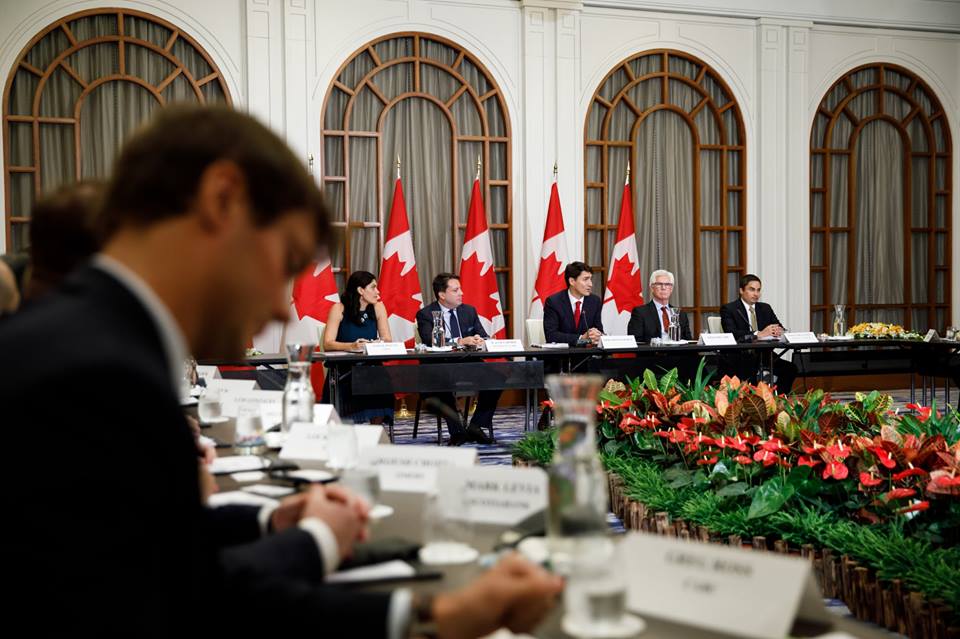
SINGAPORE — Prime Minister Justin Trudeau is landing in Singapore hoping that by the time he leaves, Canada will know how to pursue freer trade with a 10-nation bloc of major suppliers and customers.
Many members of the Association of Southeast Asian Nations have expanding consumer classes and high population-growth rates relative to the rest of the world. Combined, ASEAN’s members — the Philippines, Indonesia, Brunei, Singapore, Malaysia, Thailand, Vietnam, Laos, Cambodia and Burma — have nearly 650 million people and are already Canada’s sixth-biggest trading partner.
Their East Asia summit is one of the most important gatherings in the region and Trudeau is there for a second year in a row, having been the first Canadian prime minister to attend last year.
But experts warn Canada is at a fork in the road: Continue talks toward a group free-trade deal, which could come with big benefits but take years of painstaking work, or convince ASEAN nations that have not already done so to sign on to a newly ratified Pacific Rim trade deal, called the Comprehensive and Progressive Agreement for Trans-Pacific Partnership — or CPTPP for short.
Former Quebec premier Jean Charest says a confluence of events — Canadian trade deals finalized with Europe and Pacific Rim countries, and a new one in principle with Mexico and the U.S., while President Donald Trump raises trade barriers with others — gives Trudeau help with either path.
“It puts the prime minister in a much better position in the sense of, he’s uniquely on the offensive. He is in there to say we want to be part of (this),” said Charest, who’s the honorary chairman of the Canada-ASEAN Business Council. “It will be put in the backdrop of this broader world to say, ‘With everything that is happening on the trade front, all this makes sense for you and it makes sense for us.’ “
Trudeau spoke about problems with protectionism and nationalism over two days in Paris, on the first leg of his 10-day overseas trip. On Monday, ahead of travelling to Singapore, Trudeau said he would have “more to say in due course” on free trade with the ASEAN countries.
“We continue to be very proud of our record on signing progressive trade deals with Europe, with the United States, and with the CPTPP,” Trudeau told reporters. “We continue to discuss the possibilities of a free trade agreement with the ASEAN economies, some of Asia’s fastest-growing economies.”
A preliminary study of a Canada-ASEAN trade agreement has been done. Hammering out a final agreement could take up to eight years, Charest said.
But first the Liberals must show that they are committed to trade with east Asia, a region with a relationship-based business culture, after years of talking big but not following up.
“They have to start to trust you and I have to say, with Canada blowing hot and cold — this year we’re there, next year we’re not, economy goes down in the U.S. (so) we go to Asia, the economy gets back up in the U.S. and we head back out again — that doesn’t cut it,” said Lorna Wright, executive director of the Centre for Global Enterprise at York University’s Schulich School of Business.
The ASEAN summit also offers Trudeau a seat at a regional security gathering of 18 countries, including the U.S., China and Russia.
A seat at the security table, which the Liberals hope to parlay into a permanent spot, gives Canada a voice in decisions about tensions and issues in southeast Asia that could eventually reach Canadian shores, such as pandemics.
The security table regularly talks about tensions with North Korea, whose dictator, Kim Jong Un, has opened lines of communication with U.S. President Donald Trump.